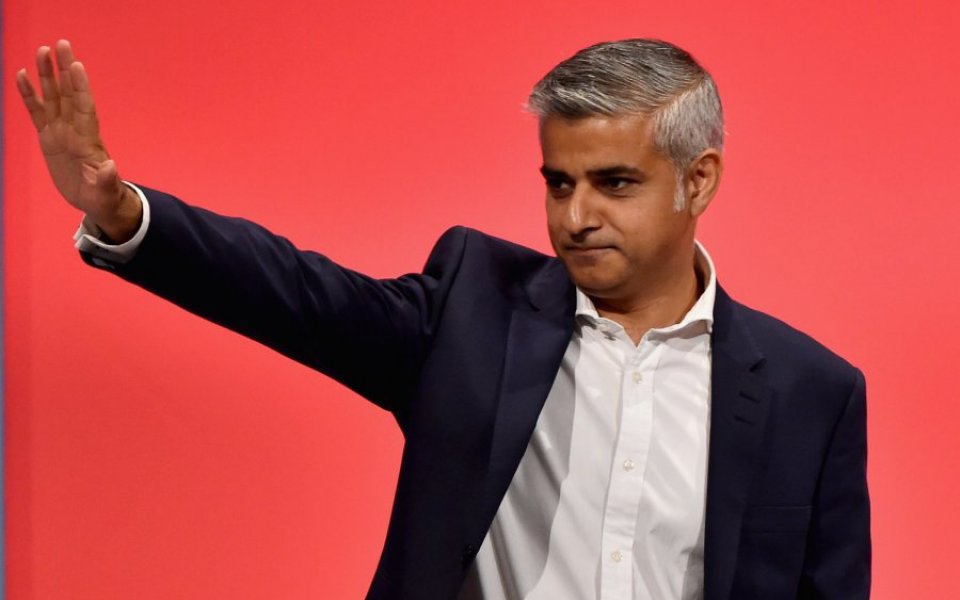Editor’s Interview: Christian May meets Labour’s mayoral candidate Sadiq Khan

Clement Attlee dominates one wall in the meeting room of the Khan campaign HQ. I’m reading the plaque when Labour’s mayoral candidate bursts into the room. “Funny story,” he says, “you’ll like this.” He offers a handshake and points to the portrait at the same time. “The only reason that’s here is because the party can’t afford to insure it at their new HQ. Apparently this office is more secure.”
So the architect of the welfare state and the man who nationalised vast tracts of industry now looks down on the candidate who promises to be “the most pro-business mayor London has ever had”.
FRONTRUNNER
Khan is seen as the frontrunner in a race that comes to a head on 5 May. Having seen off Tessa Jowell for the Labour nomination the 45-year-old MP for Tooting has been an energetic campaigner. He is, however, aware of one prominent vulnerability: two-thirds of London bosses think his Conservative rival Zac Goldsmith is pro-business, while just 29 per cent say the same of Khan.
He puts this down to the fact that Labour struggled to attract business support under Ed Miliband – a situation that hasn’t exactly improved under Jeremy Corbyn. “I’m the Labour candidate, so it’s not surprising that businesses when they’re asked about the Labour candidate associate me with their views on the Labour party.”
He accepts that his party was seen as anti-business at the 2015 election, but revels in the fact that this race allows him to stand as his own man. “I’m nobody’s patsy” has become something of a catchphrase.
His own business credentials are something he’s particularly keen to emphasise. “This is the first mayoral election where the Labour candidate is unequivocally more pro-business than the Tory candidate. That’s a fact.” Reflecting on his time as a partner in a London law firm, he says “I’ve helped run a business. I’ve had the sleepless nights worrying about wage bills, worrying about the overdraft.”
This isn’t an explicit reference to the privileged background of his Tory opponent, but it’s not a distinction he would shy away from making, either. A recent Khan campaign leaflet quoted former Heathrow chairman Sir Nigel Rudd, who attacked the Richmond MP’s inherited wealth.
EXPERIENCE
Khan thinks it’s all a matter of experience. “Zac hasn’t been deemed worthy of a front bench role. The big difference between us is that once I became an MP, I went on to be a minister. Are we really going to trust someone with Goldsmith’s experience to be the mayor of this city?” That decision will be made by the voters in just a few months time.
Between now and polling day, Khan is determined not to allow the Tories to paint him as Corbyn’s man. David Cameron’s claim that electing Khan would make Londoners “lab rats in the first experiment of Corbynomics” infuriated Khan.
But is it a fair charge? After all, Corbyn only got on the Labour leadership ballot as a result of a handful of nominations – one of which came from Khan. He tells me that he doesn’t regret helping the veteran socialist into the race, but is keen to stress to readers of City A.M. that “at no point did I say I would back Corbyn to win.” Indeed, he backed Andy Burnham in the end.
Given his desire to court the business vote, I’m keen to get a sense of how he views Labour’s new leadership. Are they a help or a hindrance? After all, between Corbyn and McDonnell there are plans to increase taxes and break up the banks. “I think there’s a real problem for Labour,” he says, adding “the most successful Labour governments have been ones that understand business”.
Labour’s shadow City minister, Richard Burgon, has been criticised for his apparent disinterest in the City. Was this a wise appointment? “You’ll have to ask Jeremy Corbyn. I didn’t appoint him.”
TORY VOTERS
Khan knows that he needs to win over Tory voters in order to triumph in this election. With that in mind, he’s keen to rule out a mansion tax, saying he would lobby Labour not to include it in a future manifesto. Likewise, he’s against the 50p top rate of tax, and says any proposals to impose a financial transaction tax would be “madness”.
The hope is that these kind of unambiguous statements will be enough to deflect the charge that he’s Corbyn’s Trojan horse. To shield himself further from such a potentially toxic accusation he goes out of his way to praise Cameron for delivering an EU referendum and Boris for standing up for London’s interests on immigration policy. He’s even prepared to give credit to George Osborne for leading trade delegations all over the world.
Khan is a professional politician. Of this there is no doubt. His answers, though detailed, do not sound spontaneous or wildly original. And yet somehow he succeeds in walking the tightrope of praising the City – “there’s a huge amount of good happening in the City” – and standing by the unions when it comes to tube strikes. It’s a precarious position, but Goldsmith will need to work hard to knock him off balance.
He concedes that Labour’s past failure to secure the support of the business community was “a source of huge embarrassment”. If he doesn’t secure it for himself, it won’t be down to lack of trying.